- Home
- David Downing
One Man's Flag Page 11
One Man's Flag Read online
Page 11
A stream of customers visited Harry & Sons. Some went in with bicycles clearly in need of repair, some came out with gramophone records, but none stayed long and none, as far as their subsequent shadows discovered, were anything other than honest customers.
Meanwhile the printer and the photographer, the houses in Ballygunge and Black Town, were all being watched around the clock, causing Cunningham to sarcastically wonder whether additional sepoys should be brought back from France. As the week progressed, McColl’s pleas for patience fell on increasingly deaf ears, particularly once Sanjay and Mridul had reported that their cover story was no longer cutting much ice among the Indian staff at the waterworks. Sooner or later someone would talk.
It was on the Friday afternoon that things began coming to a head. Tindall, McColl, and Cunningham were going through the latest reports when one of the former’s Indian officers arrived with news: the young men at Harry & Sons were feeding a pile of papers onto a bonfire in the shop’s backyard.
“That does it!” Cunningham said triumphantly. “They must know they’re being watched. We’ll have to go in now.”
“If they thought they were being watched, they’d be burning them inside,” McColl insisted. He felt far from certain that this was the right course to take.
“True,” Tindall agreed, “but there has to be a reason they’re burning them. Whether or not they’re aware of our interest, it looks like they’re preparing to leave. I think Alex is right on this one—we have to arrest them.”
McColl reluctantly gave way. “But it’ll take some arranging—I don’t think this lot will give up without a fight. And it’ll be dark in a couple of hours.”
Tindall considered. “There are four, right?”
“Including the store owner. Who does seem to be involved.”
“And how many guns have been seen?”
“Just the one, and I wasn’t sure it was a gun. But my guess is that all of them are armed.”
“With Mausers from Rodda & Company,” Cunningham muttered.
“Most likely,” Tindall agreed. “But whatever the truth of it, we have to assume they all have guns and act accordingly. I don’t want any of my men killed.”
“Or any of the enemy, if we can help it,” McColl said emphatically. “Dead men won’t tell us where the German guns are coming ashore.”
“I realize that,” Tindall said, wiping his brow with his handkerchief.
“Well, it’s your show,” McColl assured him, looking to Cunningham for support. Tindall had more experience than either of them at this sort of thing.
Cunningham grunted his agreement.
“All right,” Tindall said after a few moments’ thought. “We’ll surround the place and invite them to surrender. He went off to drum up the necessary troops, leaving McColl and Cunningham to snatch a quick meal at the Great Eastern before darkness arrived with the necessary cloak and they could take a tonga to the back entrance of the waterworks, close by the smelly canal. Sanjay and Mridul were both on the observation platform, the former peering out, the latter fast asleep. McColl and Cunningham had a turn at the louvered opening, taking in the now-familiar sight of four young men sitting round a fire.
There was something almost touching about them, McColl thought. Their youthful eagerness, their obvious camaraderie. They could have been students discussing a forthcoming game or debating the way to a better world. And tomorrow they would all be in prison. All those still alive.
The evening passed, the sounds of the city subsiding and splitting, until the occasional shout in the distance felt like an invader. In the surrounding streets, the yellow glimmers of candles and kerosene lamps winked out one by one, until the glow of the still-burning bonfire felt like the center of the world. The sky was cloudless, a near-full moon rising above the fields to the east.
Tindall arrived soon after eleven, having done the rounds of the various units now lurking nearby. He had fifty men in position, he told McColl and Cunningham. Most had modern rifles, and the unit leaders knew what was expected of them. Once the ring was tightened in the morning, the terrorists would quickly realize that they had no hope and throw in the towel.
The three of them bunked down in Huckerby’s spacious office, leaving Mridul on watch upstairs. But after a fruitless half hour spent trying to get to sleep, McColl abandoned the effort and joined the Indian at the observation post. It was past midnight, but there were still two men sitting by the fire, watching the flames and occasionally exchanging a remark. They didn’t look like men set on leaving, and McColl found himself wondering whether he should have fought harder against this operation. Perhaps it wasn’t too late. Should he wake Tindall and try to convince him? There was plenty of time to move the police and soldiers back out.
He had almost decided to do so when an Indian appeared in the street below. The man was neither walking nor running, looked, indeed, as if he were trying to run without drawing attention to the fact. His head was turning from side to side, as if he didn’t know which way an expected attack would come from.
It was too dark to make out the face, but there was something familiar about the figure. Something in the way he moved, perhaps.
It was Bhattacharyya.
McColl’s first reaction was to curse his own stupidity. The second was a feeling of admiration, the third a quiet sense of triumph. They had him.
As McColl expected, he halted outside the shop, glanced up and down the street, then turned to the door. He rapped on it quietly, clearly intent on not waking the neighborhood, and then again, much louder, as if he no longer cared. The men by the fire heard the second rap, and one went through the shop to let the visitor in. A few seconds later, both reappeared in the yard. Words were exchanged, and three sets of eyes turned toward McColl in the waterworks tower. The brightest of the three reached for the water jug and doused the fire.
“They’ll be leaving now,” McColl said. “Send up the white flare,” he told Mridul.
As he half tumbled down the stairs to Huckerby’s office, the huge waterworks windows suddenly filled with dazzling light. Tindall was already on his feet, Cunningham rubbing his eyes. McColl quickly explained what had happened and left them to put on their boots.
The constables camped out in the waterworks yard were already jogging through the gate, on their way to line the street that ran from east to west a few blocks south of Harry & Sons. A second group stationed in the gasworks would be doing the same a similar distance to the north; a third would be leaving its derelict warehouse base and blocking the way to the west; a fourth was already covering the canal to the east. With the moon now high in a still-cloudless sky, the escapers couldn’t hope for much help from the night.
He could hardly have hoped for better circumstances, but McColl couldn’t shake a gnawing pessimism. These people had eluded the best efforts of the DCI for years—why should tonight be any different?
Since Tindall had not seen fit to give him a specific task, McColl felt free to do whatever seemed appropriate. He was following the last of the constables across the Upper Circular Road, intent on joining their cordon, when he saw two figures traversing the street in the other direction. As they disappeared between two of the shops that lined the eastern side, another flare exploded above him—red this time, Tindall’s prearranged signal that men were leaving from both front and rear.
The escapees should be picked up by the troops behind the canal, but there was no point in leaving matters to chance. McColl started running down the side of the waterworks’ northern wall, thinking to intercept them before they reached the water, and had a fleeting glimpse of the two men down another long alley as they ran a parallel course. A few people were ducking their heads out of doorways, awakened by the fireworks display overhead, but they pulled them inside again when guns opened up somewhere behind McColl. Those escaping out the back must have run into the cordon.
A few seconds later, he reached the canal, a stretch of stagnant water some twenty feet wide between sloping banks about six feet high. On the far side, where McColl had expected men with rifles, a moonlit scrubland dotted with palms stretched emptily into the distance.
A hundred yards to his left, one man was already waist-deep in the water, the other scrambling down the bank to join him.
More shots echoed in the distance.
A worn path ran along the top of the bank, and McColl hurried along it, shouting at the two men to stop. They responded by opening fire with their pistols, the bullets whining harmlessly past. This lack of accuracy was comforting, but McColl’s return fire was no more precise, both men ducking their heads long after the bullets had passed. Then, while one continued wading toward the eastern bank, the other dropped further into the water to make himself less of a target and fired twice more.
His partner was now scrambling up the far bank. McColl took careful aim but missed again, and after one poignant look at his half-submerged friend, his target headed off across the scrubland.
There was shouting in the distance and signs of movement farther up the canal, but the man was getting away. Conscious that he had only three bullets left, McColl steadied his arm and fired once more, but the man seemed to stumble at the worst possible moment. Running on, he was soon no more than a fading shape.
The man in the canal had let off another two shots in the meantime, with a similar lack of accuracy. He was now clambering out of the water on McColl’s side and raising his arms in surrender as soon as he physically could. It was Bhattacharyya.
The two of them walked toward each other. McColl knew he should shoot this Indian—if not to kill him at least to restrict his mobility—and leave himself free to pursue the partner. He couldn’t do it.
“I ran out of ammunition,” Bhattacharyya volunteered as he drew nearer.
A minute later a group of Tindall’s constables appeared on the far side of the canal, and McColl, without much hope, sent them off in pursuit. The reason for their earlier absence, he later discovered, was alarmingly simple. Ordered to line the canal, they had simply guarded the bridges. What kind of man, one appalled constable asked McColl, would deliberately place his body in a channel full of shit?
Over breakfast at the Great Eastern, McColl heard the unmistakable sound of distant cannons and assumed that some dignitary was visiting the city. Arriving at Tindall’s office for a postmortem of the previous night’s events, he found that he’d been misled. According to Cunningham, some idiot army officer, noticing that it was August 4, had decided to mark a full year of war with a twenty-one-gun salute across the Hooghly. Using live shells. Two houseboats had been sunk, and two children were missing, presumed drowned.
The governor, worried that the police might make a bad situation worse, had insisted that Tindall take charge, leaving McColl and Cunningham to review events without him.
The picture, still fuzzy at 2:00 a.m., was now clear enough. Of the five men known to have been staying at Harry & Sons, two were dead, two still at large, and one—Bhattacharyya—in custody. Two of the three men who had clambered over the back wall had been shot dead in the alleys beyond, but the other had vanished from view and was probably hiding somewhere in Black Town. The man who had escaped from McColl had eluded the subsequent search of the surrounding countryside; two constables, seeing movement in the distance, had shot and badly wounded one of their own.
Harry & Sons had been searched in the immediate aftermath and again a few hours later with the help of natural light. The shop had yielded little, just three tags attached to the handlebars of bicycles left for repair, each bearing a single name with no accompanying address. The four terrorists had been sleeping on camp beds in two of the upstairs rooms, their clothes—both traditional and Western—were as neatly hung as their mothers would have wished. McColl went through every pocket in search of a telltale laundry, train, or library ticket but found none. The only other personal effects were books, and these yielded no helpful markings; the opening pages of one volume, which might have held the owner’s name in ink and imprint, had been assiduously ripped out and probably thrown on the fire. The enemy was proving himself a worthy adversary.
All they had was Bhattacharyya, and he, having offered his life to ensure a comrade’s escape, seemed unlikely to spill any beans.
There were still the printer and the photographer, who now could be questioned without fear of raising an alarm, and Harry’s neighbors, one or more of whom might have seen something revealing over the last few weeks. Whether they would share such information with the police was a moot point. McColl was not hopeful.
Neither was Cunningham, but the Five man’s disappointment was mitigated by self-vindication. “If we’d arrested them straightaway as I suggested, we’d have four in the bag now rather than one.”
“You don’t know that,” Tindall objected, but only halfheartedly.
He was right, McColl thought, but then everyone was on occasion. “Why don’t you bring the printer and the photographer in?” he suggested. “I’ll get back to the shop and make sure Tindall’s men are asking the right questions.”
As his tonga rattled down Bow Bazaar Street, McColl thought the looks turned his way seemed more than usually hostile. The news of the cannon-fire deaths had presumably spread by now. The fool who’d ordered it should be court-martialed but would probably receive nothing more than a few words of admonition. Perhaps Jugantar would send him a letter of thanks for boosting their recruitment.
There wasn’t much sign of the Raj’s popularity on Upper Circular Road that morning. Four officers had spent the last few hours knocking on doors, a pair working either side of the dusty street, and though they seemed proficient enough to McColl, none of the residents had told them anything useful.
McColl went back to Clive Street for lunch, then checked out Cunningham’s progress with the printer and the photographer. The latter was a dead end—the terrorist had been booking the man to take pictures at a friend’s upcoming wedding. The printer was still refusing to talk but was almost certainly guilty of churning out pamphlets and posters for proscribed political groups. Cunningham guessed he would eventually admit to the dubious customers but then deny all knowledge of names or addresses.
McColl made his way back to Harry & Sons, where he and Tindall’s men had agreed to meet before paying their evening calls. The four policemen were out in the yard when he arrived, sitting on the same chairs that the Jugantar boys had occupied. It crossed McColl’s mind that these four were about the same age as the terrorists; the only difference, he thought with a sinking heart, was that his lads, though nice enough, were probably less intelligent.
There was no point starting much before seven, and while they were waiting in the gathering darkness, there was a hammering on the front door. Hoping against hope that it might be another terrorist who didn’t know that his comrades had been arrested—a German courier would really make his day—McColl stationed men on either side of the building and went to answer the door.
Opening it, he found himself face-to-face with a Bengali boy of about fifteen. The boy jumped when he saw a white man and jumped again when armed Indian police appeared around both corners of the shop. “Who are you?” he blurted out. “Where is the bicycle repairman?”
At McColl’s gesture the police hustled the boy into the shop and closed the door.
“What’s your name?” McColl asked.
“Subrala, sahib. But it’s my father’s name on the bicycle.” He was looking around as he spoke. “That’s it over there. My father’s name is Narayan.”
McColl remembered that name on a tag.
“But it hasn’t been mended,” the boy said disappointedly. “The chain is still loose.”
McColl sighed. He could think of no reason not to let the boy take his father’s bicycle. Subrala was still looking round, eyes full of
surprise. “Where is everything?” he asked. “Have they gone away?”
“Why would you think that?” McColl asked him.
The boy shrugged. “It was so full in here—you could hardly move for all the gramophones and boxes of records. And there must have been twenty bicycles.”
After the boy had gone, McColl gathered the police officers together and told them what he’d learned. “Shifting that much stuff would have taken several carts,” he said. “Someone must have seen them.”
And several people had. But the three carts they remembered, which had stood outside the shop for a whole day and night the week before, had not borne any identification. Which ruled out the state railway and the more prestigious moving firms, but not much else. It was only toward the end of the evening that a Bengali from two houses down told them something useful. Arriving home for lunch one day, he had seen the movers loading their carts, and, leaving an hour later, he had noticed the same two men chatting to the owner of the next-door chaikhana.
McColl and one of the officers revisited the closed and boarded teahouse and eventually persuaded the frightened woman inside to open the door. Her husband was whom they wanted, she almost wailed. And he had gone away, leaving her to cope with everything. He had spoken to the movers, but he hadn’t said anything to her. He never did.
McColl asked when he’d be back.
“Three weeks,” was the depressing reply. He’d gone to visit his brother in Bombay. Their names were Asok and Amarnath Bagchi, and no, she didn’t have the brother’s address.
McColl apologized for frightening her and said they would return to interview her husband.
It was something, he thought as they walked back across the street. There seemed a fair chance that the man would have asked where his talking companions were from, and finding the movers might set them on the terrorists’ trail once again. Something, but not much. By the time he came back, the trail would be cold, if anything in Calcutta could be so described.

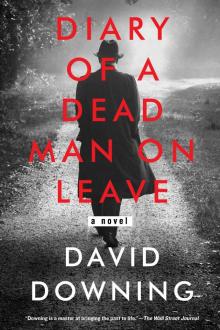 Diary of a Dead Man on Leave
Diary of a Dead Man on Leave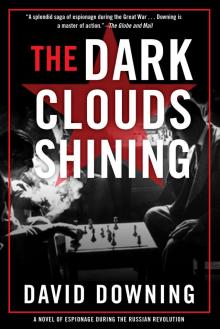 The Dark Clouds Shining
The Dark Clouds Shining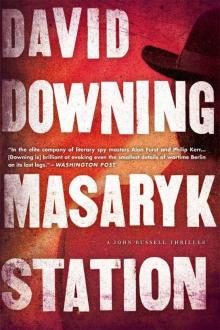 Masaryk Station (John Russell)
Masaryk Station (John Russell)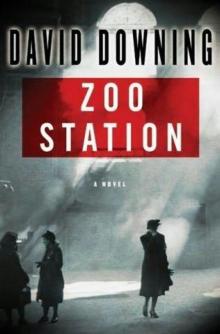 Zoo Stationee
Zoo Stationee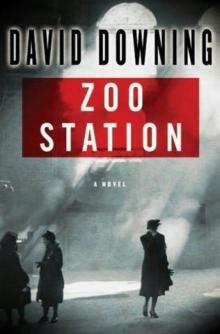 Zoo Station jr-1
Zoo Station jr-1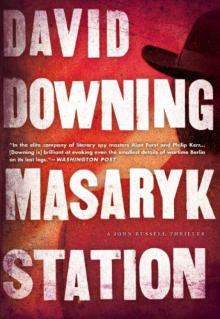 Masaryk Station
Masaryk Station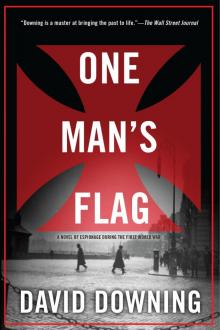 One Man's Flag
One Man's Flag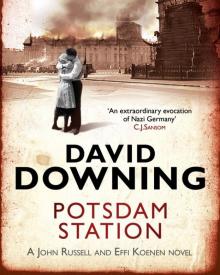 Potsdam Station jr-4
Potsdam Station jr-4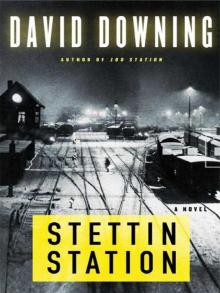 Stattin Station jr-3
Stattin Station jr-3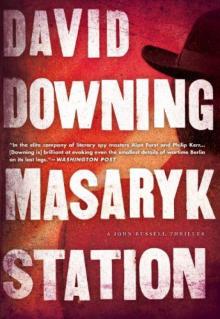 Masaryk Station jr-6
Masaryk Station jr-6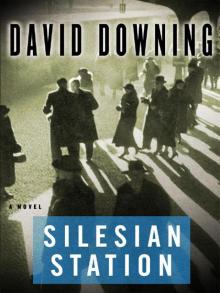 Silesian Station (2008) jr-2
Silesian Station (2008) jr-2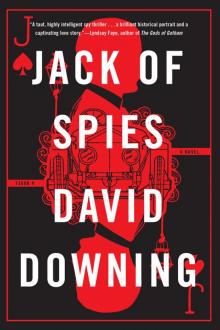 Jack of Spies
Jack of Spies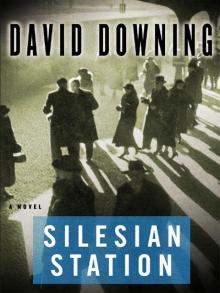 Silesian Station (2008)
Silesian Station (2008) The Moscow Option
The Moscow Option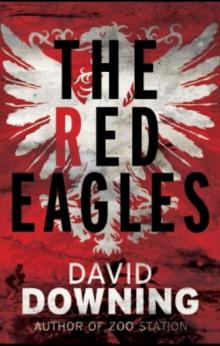 The Red Eagles
The Red Eagles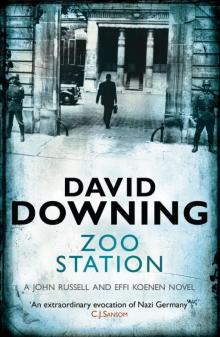 Zoo Station
Zoo Station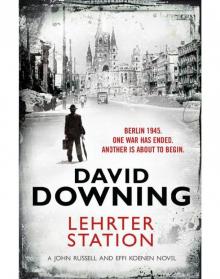 Lehrter Station
Lehrter Station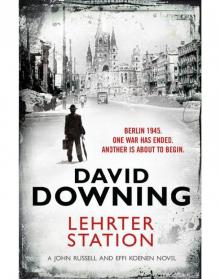 Lehrter Station jr-5
Lehrter Station jr-5